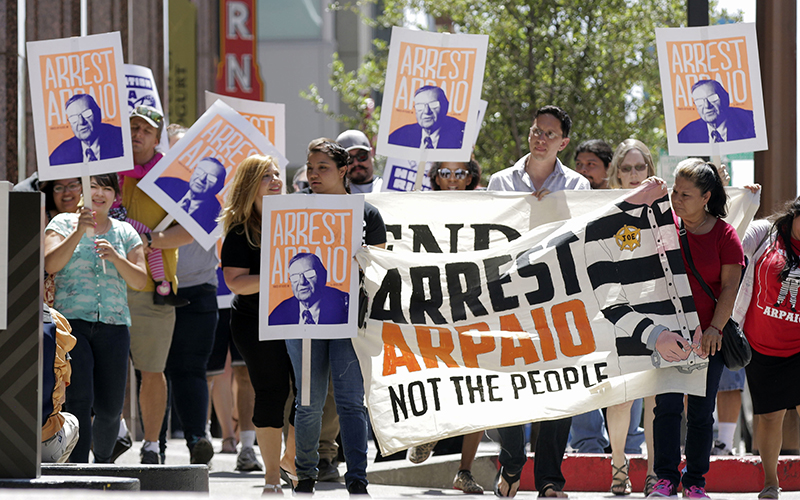
Several dozen protesters took to the streets of downtown Phoenix on Monday to demand the arrest of Maricopa County Sheriff Joe Arpaio. (Photo by Brian Fore/Cronkite News)
When Daniel Magos first learned Friday that a judge referred Maricopa County Sheriff Joe Arpaio to the U.S. Attorney’s Office for criminal contempt of court prosecution, he felt a flood of relief and elation. And then he wept.
Magos, 71, is a plaintiff in an ongoing class action civil rights federal lawsuit in which Arpaio and his department were found to have racially profiled Latino drivers and passengers in Maricopa County.
On Friday, G. Murray Snow, the federal judge presiding over the case, ruled that Arpaio and three others be referred to the U.S. Attorney’s Office for prosecution of criminal contempt of court. The contempt of court ruling stems from the judge’s finding that Arpaio willfully violated several court orders. The violations included disobeying an order to stop enforcing immigration and failing to disclose evidence.
For Magos, an American citizen who is a retired construction and maintenance worker and now works as a school crossing guard, the racial profiling case is personal.
In an interview Monday at his home, where an American flag waves in front of the house, Magos said he was racially profiled and illegally stopped by one of Arpaio’s deputies in 2009, and is still afraid of law enforcement when he walks down the street. He said he hopes the contempt of court referral will result in the Maricopa County Sheriff’s Office gaining more trust in the Latino community.
“Even now I get emotional,” Magos said, “I cried out of joy that finally something was being done that he (Arpaio) understands.”
Magos said a “strong hand” was necessary for the sheriff, whom the judge ruled had violated court orders.
When asked for comment on the sheriff’s criminal contempt of court referral, the Maricopa County Sheriff’s Office referred Cronkite News to Arpaio’s criminal attorney, Mel McDonald.
McDonald told Cronkite News the sheriff’s legal team is prepared to “fight this to the bitter end.” He said Arpaio is “not guilty so there will be no pleas…if a referral is made we are going to take the trial.” The referral comes less than two weeks before Arpaio will face a challenge for his office in the Arizona primary election.
Magos said he immigrated to the United States in the late 1950s from Chihuahua, Mexico, to escape the economic conditions there. He gained his citizenship in 1967, and was overwhelmed with pride.
“I’ve been trying to do as much as I can for this nation,” he said.
In 2009, Magos said, he was driving with his wife northbound on 27th Avenue toward one of his job sites. At an intersection, he said, a sheriff’s deputy made a sudden u-turn, sped up, and began driving behind his car.
“You could hear the engine roaring as he accelerated,” Magos recalled. “I moved on to give him room and then I finally realized he was after me.”
Magos said he waited a few minutes, then got out of his truck to see what the deputy wanted.
“From there on it was nothing but uncivilized tone of voice directed at me and directed at my wife,” Magos recalled. The deputy yelled, put his hand on his gun, ordered Magos against the car, kicked his feet apart, and patted Magos down in the groin area, Magos said.
Magos said he felt “humiliated, defenseless, worthless.”
The experience traumatized his late wife, he said, and the fear of law enforcement continues to dog him today. Human rights advocate group Puente Arizona took to the streets of downtown Phoenix with several dozen protesters on Monday to demand the arrest of Arpaio.
The plaintiffs of the case were “very pleased” the judge went through with the criminal referral, said Dan Pochoda, senior counsel of the American Civil Liberties Union of Arizona.
The court action came, Pochoda said, after the plaintiffs recommended the judge refer Arpaio and his chief deputy to criminal contempt of court for their flouting of court orders and their false statements in court.
“We thought that the community deserved to have the sheriff face adequate penalties for his flouting the law,” Pochoda said.
A large, inflatable balloon of Arpaio dressed in a striped prison uniform, picket signs of “Arrest Arpaio” and protesters echoing chants of “Arrest Arpaio, not the people” occupied the bustling city corner just outside the office of John Leonardo, the U.S. attorney for the district of Arizona, in hopes that Leonardo would arrest Arpaio based on Snow’s recommendation.
Puente Arizona director Carlos Garcia joined in the protest, leading chants and sharing his stories with megaphone in hand.
“If Joe Arpaio doesn’t get arrested and John Leonardo does not do his job in arresting Sheriff Arpaio,” Garcia said, “we will continue to organize, bring lawsuits, do whatever we need to do to make sure Arpaio does not hurt our community.”
No openly pro-Arpaio activists were present at the rally, but Kathryn Kobor, a long-time Arpaio supporter, said in a phone interview she did not think the sheriff’s criminal contempt of court was justified. She believes the sheriff might have made mistakes but was trying to keep people safe from undocumented immigrants who commit crimes.